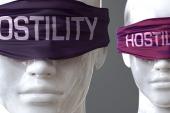ACC Survey Reveals Racial/Ethnic Gaps but Also Job Satisfaction
Data from 2015 can inform today’s efforts to understand and combat discrimination in cardiology, Kevin Thomas says.

Conducted in 2015, the survey provides a snapshot of cardiologists’ experiences with diversity that reveals some good news and some bad. There’s also the question of what these data mean now, 6 years later, when so much has changed in the world to spark awareness, from Black Lives Matter’s contributions to COVID-19’s inequities. Cardiology journals and professional societies alike have begun to set standards to combat racism.
“I think the ACC has, for a while now, been a really staunch proponent and advocate for equity, diversity, and inclusion-related issues,” Kevin L. Thomas, MD (Duke University, Durham, NC), the paper’s lead author, told TCTMD. Recently, “there’s been a heightened awareness with everything that’s gone on—the police brutality and the social justice movements that are occurring, [then] the pandemic has brought a lot of this to the forefront as well—so the confluence of all those things together led us to look at some of the data we had from the [professional life survey].”
What they found is a paradox—although nine in 10 respondents in minority groups said they were satisfied with their careers, about half reported discrimination. “So you wonder,” said Thomas, “what’s driving what here?”
One possibility is that their survey, which he stressed has a small number of underrepresented minorities (URMs), didn’t capture a wide enough sample of people who think differently, suggested Thomas. “Or this is truly a very resilient group that despite the challenges are rising to the top and doing well and thriving.”
The ACC’s questionnaire touched on a broad swath of topics: demographics, career satisfaction, discrimination, mentorship, personal/family concerns, and radiation safety, among others. The response rate was 21%. Most respondents (58%) were men, and the majority (around 84%) were adult cardiologists, followed by pediatric cardiologists and cardiovascular surgeons.
Insight on Career Trajectories
For their paper published in the October 26, 2021, issue of the Journal of the American College of Cardiology, Thomas and colleagues analyzed the numbers by race/ethnicity. Of the survey’s 2,245 respondents who supplied this information, 197 were considered URMs: 80 Black, 113 Hispanic, and four Native American cardiologists. In addition, there were replies from 564 Asians/Pacific Islanders, 1,447 whites, and 37 people who chose “multiracial/other.”
URMs were more apt to work in solo practices than were whites (8% vs 3%), while Asians/Pacific Islanders were more likely than white respondents to work in physician-owned practices (19% vs 14%) or at a government hospital or agency (7% vs 5%). Although the difference wasn’t statistically significant, URMs were more apt to be clinical cardiologists than were whites (56% vs 49%). Mentoring was available for 75% of all respondents, with Asian/Pacific Islander physicians most likely to report their mentor having a positive influence on their career.
Whether it’s in professional organizations like the ACC or it’s at our own respective institutions, we have to have zero tolerance. Kevin L. Thomas
Additional data showed that while URMs were less likely than white respondents to emphasize salary, benefits, and work hours when negotiating for their first job after training, this was no longer the case in subsequent jobs. As they progressed in their careers, URMs and Asians/Pacific Islanders became more likely than whites to prioritize positions featuring “travel benefits, diversity, mentoring, workspace, time to promotion or advancement, academic rank, and roles with community, institutional, or national recognition.”
There were no racial/ethnic disparities in outpatient versus hospital settings, nor in how respondents divvied up their time spent on practicing medicine, administrative duties, education, and research. Moreover, around 90% reported being satisfied with their careers, while 64% of URMs, 64% of Asians/Pacific Islanders, and 66% of whites were satisfied with their financial compensation. “Most cardiologists believed their level of advancement was similar to peers and were satisfied with their career opportunities; neither differed by racial and ethnic group,” the study authors note.
Also similar was satisfaction with family life, at around 85%, despite the fact that Asians/Pacific Islanders were more likely than whites to be the primary caregiver for their parents (75% vs 63%).
Discrimination Didn’t Track With Burnout
Less positive were the findings on discrimination: 52% of URMs and 46% of Asians/Pacific Islanders said they had experienced it in their careers, as compared to 36% of whites. Half of cardiologists said this affected professional activities with colleagues and a quarter said it impacted interactions with patients.
Women, no matter their race/ethnicity, were more likely than men to report discrimination. The lowest rate was seen in white men (14%) and the highest in white women (69%). Related to race in particular, discrimination was more often experienced by URM and Asian/Pacific Islander women than by men in the same categories.
“Men were more likely to experience race- and religion-based discrimination,” Thomas et al say, “whereas nearly all women reported sex discrimination, with parenting as an important second reason.”
There did not, however, appear to be a direct link between discrimination and burnout. Fewer URMs and Asians/Pacific Islanders than whites reported burnout (22% and 20% vs 30%). Indeed, white cardiologists “were more likely to indicate ‘a great deal of stress because of their job,’” the paper notes.
More and More Dialogue
Citing a “silver lining” to the tragedies of the past few years, Thomas said, “I do think what people feel is a more widespread sense of unity, where people are having these kinds of conversations more often” about discrimination in the workplace, including microaggressions and feelings of isolation.
As to what cardiologists can do now at their own workplaces, he said, “education is important”—for instance, taking the time to understand what terms like structural racism and implicit bias actually mean. In conversations, “[we need] to listen and not be defensive. That goes for both sides. . . . We also have to show grace when people make mistakes,” Thomas advised.
What’s also crucial is holding people accountable when discrimination occurs, he emphasized. “Whether it’s in professional organizations like the ACC or it’s at our own respective institutions, we have to have zero tolerance. . . . That message has to come from the top and it has to be grassroots, too.”
Thomas urged: “Feel empowered to speak out when you see these acts that you know are wrong, and don’t worry about how it sounds.” It doesn’t have to be confrontational, he noted—what’s more important is being comfortable enough to have a dialogue and raise questions.
Caitlin E. Cox is Executive Editor of TCTMD and Associate Director, Editorial Content at the Cardiovascular Research Foundation. She produces the…
Read Full BioSources
Thomas KL, Mehta LS, Rzeszut AK, et al. Perspectives of racially and ethnically diverse US cardiologists: insights from the ACC Professional Life Survey. J Am Coll Cardiol. 2021;78:1746-1750.
Disclosures
- Thomas reports no relevant conflicts of interest.





Comments